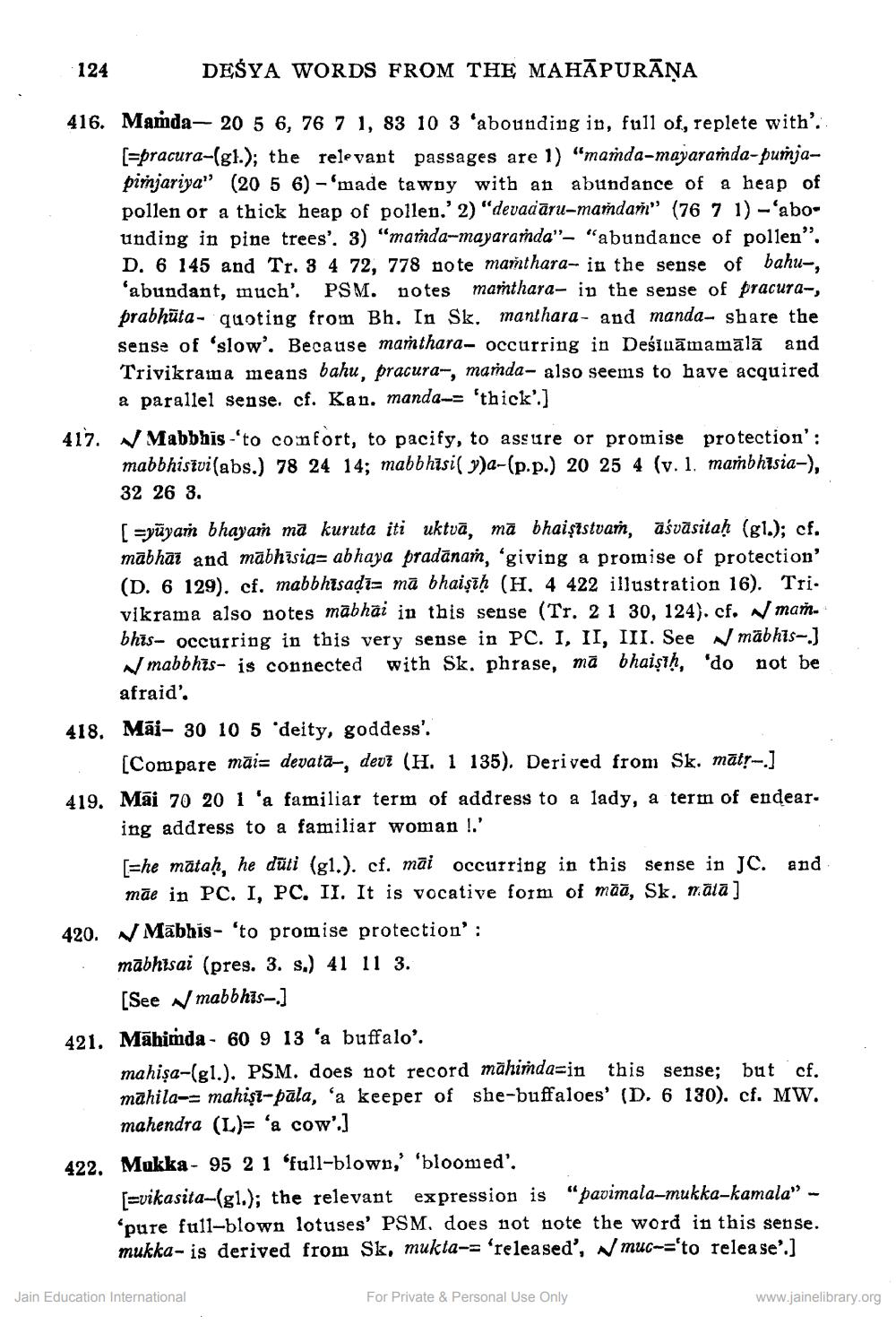________________
124
DEŚYA WORDS FROM THE MAHĀPURĀŅA
416. Mamda- 20 5 6, 76 7 1, 83 10 3 abounding in, full of, replete with'.
[=þracura-(gl.); the relevant passages are 1) "mamda-mayaranda-pumjapinjariya" (20 5 6) - 'made tawoy with an abundance of a heap of pollen or a thick heap of pollen.' 2) "devadāru-mandari" (76 7 1) -'abounding in pine trees'. 3) "manda-mayaranda"- "abundance of pollen". D. 6 145 and Tr. 3 4 72, 778 note maħthara- in the sense of bahu-, 'abundant, much'. PSM. notes marthara, in the sense of pracura-, prabhūta - quoting from Bh. In Sk. manthara- and manda- share the sense of 'slow'. Because mamthara- occurring in Deśitāmamālā and Trivikrama means bahu, pracura-, manda- also seems to have acquired
a parallel sense. cf. Kan. manda-= 'thick'.] 417. V Mabbhis-'to confort, to pacify, to assure or promise protection':
mabbhisīvi(abs.) 78 24 14; mabbhīsi(y)-(p.p.) 20 25 4 (v. 1. mambhisia-), 32 26 3.
[ =yüyam bhayam ma kuruta iti uktuā, mā bhaişžstvar, aśvāsitaḥ (gl.); cf. mabhai and mabhisia= abhaya pradānam, 'giving a promise of protection' (D. 6 129). cf. mabbhtsadī= mā bhaisīḥ (H. 4 422 illustration 16). Tri. vikrama also notes mabhai in this sense (Tr. 2 1 30, 124). cf. manbhis- occurring in this very sense in PC. I, II, III. See » mäbhis-.)
mabbhis- is connected with Sk. phrase, ma bhaisih, do not be
afraid'. 418. Māi- 30 10 5 'deity, goddess'.
(Compare mais devata , devi (H. 1 135). Derived from Sk. mātı-] 419. Mãi 70 20 1 'a familiar term of address to a lady, a term of endear.
ing address to a familiar woman !!' [=he mātah, he dūti (gl.). cf. māi occurring in this sense in JC. and
māe in PC. I, PC. II. It is vocative form of mäā, Sk. wala] 420. „Mābhis- 'to promise protection':
mabhisai (pres. 3. s.) 41 11 3.
[See » mabbhis-] 421. Māhimda - 60 9 13 'a buffalo'.
mahişa-(gl.). PSM. does not record mähimda=in this sense; but cf. mahila-- mahişt-pala, 'a keeper of she-buffaloes' (D. 6 130). cf. MW. mahendra (L)= 'a cow'.]
422, Mukka - 95 2 1 'full-blown,' 'bloomed'.
T=vikasita-(gl.); the relevant expression is "pavimala-mukka-kamala" - 'pure full-blown lotuses' PSM, does not note the word in this sense. mukka- is derived from Sk, mukta-= 'released', N muc-='to release'.]
Jain Education International
For Private & Personal Use Only
www.jainelibrary.org




